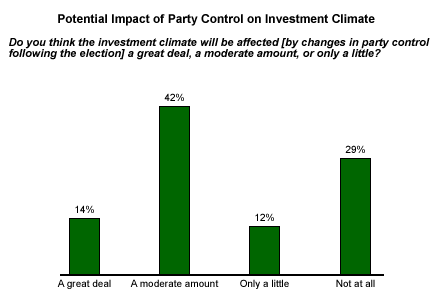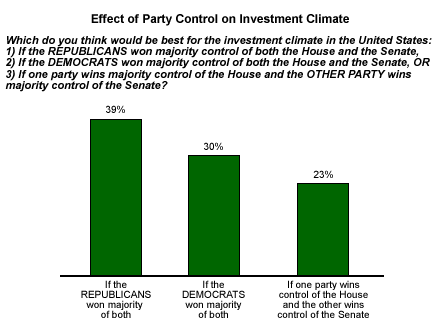There is a great deal of optimism on Wall Street these days, which is no surprise given four straight weeks of increases in the Dow. But the optimism doesn't stem from the belief that the U.S. economy is improving. Instead, some of it comes from a historical trend that is totally unconnected to the economy -- the fact that November is usually a good month for stocks. More importantly, however, many people are expecting fiscal and monetary policy-makers to take significant steps to stimulate the economy following today's elections.
As far as monetary policy is concerned, the consensus seems to be that the Fed will increase rates 25 basis points -- maybe even 50 basis points when the Federal Open Market Committee (FOMC) meets this week. As for fiscal policy, many prognosticators think changes will be made to the Bush administration's economic policy team following the elections. Some argue that this will lead to more presidential leadership on the economy, which will in turn help produce a new fiscal stimulus for the economy.
Most intriguing, however, is the speculation by some market observers that the Republicans will not only keep control of the House of Representatives, but also gain control of the Senate. If this happens, they suggest that Congress will adopt new investor-related tax incentives and ease federal regulations. Of course, if the Democrats take over the Congress, then any new economic stimulus plan would be the result of a compromise between the president and Congress.
Elections Investment Climate Impact
How much will the elections affect the investment climate? According to the latest Gallup/UBS Index of Investor Optimism survey*, investors are fairly evenly split in their opinions on this question. More than half (56%) of the nation's investors say the elections will have a "great deal" (14%) or a "moderate amount" (42%) of impact. Still, another 41% say they think that the elections will have "only a little" impact or that they won't impact the U.S. investment climate at all.

Impact of Party Control on Investment Climate
Does it matter to Wall Street which party controls Congress? Again, investors are pretty well split about how party control of the House and the Senate will impact the investment climate. More investors say that it will be best for the investment climate if the Republicans (39%) -- as opposed to the Democrats (30%) -- win control of Congress. Still, nearly one in four investors (23%) say the best outcome would be for one party to control the House and the other the Senate.

Key Points
Most of the time, I would agree with those investors who think having one party control the House and the other control the Senate is best for the U.S. investment climate. The U.S. economy is a wonderful market system that tends to perform best free of government interference. When the political parties split congressional power, stalemate is more common and government intrusion is less likely.
Right now, however, the U.S. economy is in an unusual situation. It has experienced numerous shocks over the past couple of years. Fed Chairman Alan Greenspan has repeatedly pointed out that the economy has managed to absorb these shocks with surprising resilience. Still, it is obvious that the economy is getting weaker and needs significant help.
The Fed can provide such help, but its impact is limited at today's interest rate levels. It is going to take some strong fiscal policy actions to stimulate a real economic recovery. Unfortunately, there is no consensus encompassing both political parties about what the government should do to help create such a recovery. That consensus is more likely to come about if one party or the other controls Congress. As a result, my vote is for single-party control of Congress following today's elections.
At this juncture, the need for swift and decisive government action on the economy outweighs whether its precise composition is the result of a compromise between a Democratic Congress and a Republican president or simply a Republican plan. Unfortunately, most political prognosticators believe that Republicans will remain in control of the House and the Democrats in control of the Senate. And, continued political stalemate is the last thing the economy needs.
*Results are based on telephone interviews with 1,001 investors, aged 18 and older, conducted Oct. 1-17, 2002. For results based on the total sample of investors, one can say with 95% confidence that the margin of sampling error is ± 3%.

